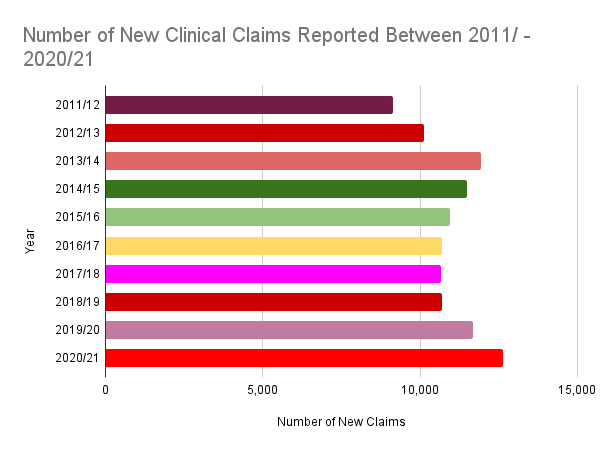By Stephen Parker. Last Updated 12th January 2023. In this guide, we look at the process of claiming compensation for an injury or illness caused by prescription errors. Medical professionals owe a duty of care to those who they treat. If this duty of care is breached and you’re harmed as a result, you could claim.

Guide on claiming for prescription errors
This guide looks at what you can do if you were given the wrong drug by a pharmacist, a GP, or a hospital and how you could claim against the relevant NHS Trust or organisation for any injuries it causes.
Are you already trying to deal with the consequences of prescription errors? If so, you can talk to our team right now to see if they can connect you with a solicitor from our panel of medical negligence experts. Simply get in touch by:
- Calling us for free on
- Using our contact us option
- Speaking to a member of our team through the live support portal
Choose A Section
- What Are Prescription Errors?
- Medical Negligence Compensation
- Examples Of How Doctors Make Errors With Prescriptions
- How To Prove Medical Negligence
- What Does A No Win No Fee Lawyer Do?
- Extra Information About Prescription Errors
What Are Prescription Errors?
Every patient that uses healthcare services has a legal right to receive a level of care that is to the generally accepted standards of practice in that area of medicine. Therefore, any qualified healthcare provider in a position to issue a prescription can be held liable for a prescription error mistake that causes harm and happens because of a breach of duty of care.
This can include:
- GPs
- Pharmacists
- Hospital doctors
- Dentists
- Nurses
Prescription errors have the potential to cause severe illness, cause your condition to worsen or even be fatal. If the wrong medication has made you ill, you could be entitled to launch a medical negligence claim for compensation against the organisation concerned.
In the sections below we explain the proof you need to uphold your claim and how your claim can be valued based on the effect that this has had on you. We conclude by explaining how legal representation can help you launch a medical negligence claim today.
Prescription Error Statistics
Statistics from the NHS Resolution Annual Report 2021 show the rates of new claims for clinical incidents over a ten-year period. As you can see, there has been a slight increase in the total number of claims made compared with 2011/12.

Medical Negligence Compensation
When you make a claim, your settlement could consist of two different heads of claim. These are called general and special damages. Your medical negligence compensation will only include special damages if you’ve suffered financially as a direct result of your injuries. Compensation for general damages covers the pain and suffering you’ve endured.
Compensation for medical negligence varies from case to case. Each case is unique, and the final compensation that may be awarded is meant to reflect your individual circumstances. For those looking for examples of medical negligence payouts in the UK, you can view the compensation brackets in the table below for certain injuries that may be claimed for in a prescription error claim.
The compensation brackets are based on those found in the Judicial College Guidelines. Solicitors assisting with prescription error claims may use these guidelines as references to help calculate the value of your injuries.
| Type of injury | Notes | Award |
|---|---|---|
| Kidney (a) | Where both kidneys are lost or permanently harmed | £169,400 to £210,400 |
| Kidney (b) | Risk of future infection in the urinary tract or other kidney function loss. | Up to £63,980 |
| Kidney (c) | Loss of one kidney where the other is not damaged. | £30,770 to £44,880 |
| Bowels (a) | Double incontinence, total loss of bowel and urinary functions. | Up to £184,200 |
| Bowels (b) | Total loss of function and colostomy dependent. | Up to £150,110 |
| Digestive system (non-traumatic) (i) | Serious and acute pain, vomiting, diarrhoea, fever necessitating hospital admission for a period of weeks. | £38,430 to £52,500 |
| Digestive system (non-traumatic) (ii) | Serious diarrhoea and vomiting over two to four weeks with some discomfort and impact on sex life felt for a few years. | £9,540 to £19,200 |
| Digestive system (non-traumatic) (iii) | Discomfort, stomach cramps, altered bowel function and tiredness. Complete recovery within one year. | £3,950 to £9,540 |
| Digestive system (non-traumatic) (iv) | Disabling pain, cramps and diarrhoea that lasts for days or weeks. | £910 to £3,950 |
| Spleen (a) | Where the spleen is lost and there's an ongoing risk of internal infection because of damage to the immune system. | £20,800 to £26,290 |
These amounts are not absolutely certain. Furthermore, you may be asked to attend a medical assessment with an impartial medical specialist; this can be used to work out how much compensation your claim is worth.
Special damages
In addition to health concerns, you may suffer financial problems caused by prescription errors. For example, if you cannot work because you are sick you could see a drop in income.
You might be too ill to attend to essential domestic needs and have to rely on family or friends or pay for professional help. In worst-case scenarios, you may have to pay for additional medical procedures that are not available on the NHS.
Special damages can be calculated by taking all the proof you have of these costs and including them as part of your settlement request. It’s important to note that the evidence must be documented items like receipts, bills, wage slips, or invoices and they must be costs that directly relate to the injuries you sustained from prescription errors.
Get in touch with our team and they can help you collect any evidence you may have to support a claim for other expenses like these.
Examples Of How Doctors Make Errors With Prescriptions
Incorrection prescriptions can create a whole array of serious health and psychological problems for the patient, so how might negligence issues like this arise? There are three general types of prescription errors:
- Failing to prescribe– You may be known to be suffering from a certain condition but a breach of duty of care means your doctor makes a mistake about what medication would be suitable to treat your condition.
- Incorrect dosage– You’re told to take too much or too little of a medication you’re prescribed. This could cause you to overdose or might mean that the drug does not work as expected.
- Wrong information given- For example, you might not be told to take a certain medicine with food when you should, leading to health conditions like stomach ulcers or inflammation
In addition to these, there are other actions that could badly harm a patient if the medicine being advised for them by a GP or healthcare provider is not correct, such as:
- Not reading patient notes, leading to them being prescribed medication that they are allergic to
- Keystroke errors when inputting information
- A nurse administering medicine to a patient that is intended for someone else
For
How To Prove Medical Negligence
Proving how medical negligence caused you harm is a fundamental part of a compensation claim. So it’s important to gather as much information as you can to show clear evidence of the prescription error medical negligence. You can do this by:
- Accessing your medical records
- If anyone witnessed the negligence, collect their details so that they can make a statement later
- Using CCTV footage if that is possible
- Keeping a diary of events, including the progression of your symptoms
- Retaining all packaging of medicines and prescription receipts
- Photographic proof of visible signs of illness or injury
- Report your adverse drug reaction through the government’s Yellow Card Scheme for reporting problematic medicines and drugs, if appropriate.
With these pieces of information to bolster your claim, it can be much easier to demonstrate that the standards of care you have a right to expect from any healthcare provider were not met, and that this caused you harm.
Time Limits
It’s important to note that there are time limits to starting a medical negligence claim as detailed in the Limitation Act 1980. Generally, you have three years to start a claim. This period can begin from either:
- That date of the incident that caused you harm, or;
- Or the date that you became aware that you were harmed by medical negligence
For example, you may have taken medication as prescribed by a GP or hospital and not felt any immediate ill effects. Your time limit can run from the date you connected your condition to medical negligence (or the date when you could have been expected to make this connection).
What Does A No Win No Fee Lawyer Do?
A No Win No Fee lawyer can work for you under a legal agreement called a Conditional Fee Agreement, which means you only need to pay them if your case wins. A maximum of 25% will be is deducted from your settlement at the end. You don’t need to pay anything to engage their services or anything while they work on your case.
Under this kind of agreement, if your claim fails, you won’t need to pay your solicitor at all. Funding arrangements like this mean you can access high-quality legal representation regardless of your financial position.
Claim Compensation For Prescription Errors
Why not see if you can start your claim right now by getting in touch? Our sympathetic team can offer free guidance about claims for prescription errors and advice to assess your compensation claim. They could possibly direct you to a No Win No Fee medical negligence specialist from our panel to help:
- So call us for free on
- Use our ‘contact us’ option
- Speak to us through our live support portal
Extra Information About Prescription Errors
Lastly, below are further resources about prescription errors and how to claim compensation for medical negligence:
- Read more about managing your medicines
- In addition to this, here are details about paying for your own care
- Also, details on how to raise a concern about your GP or practice
Other Guides That May Help
- What Are Birth Injury Claims?
- What Are Never Events And How Do I Claim For Them?
- Making A Claim After Receiving Unnecessary Medical Treatment
- How Much Could I Claim For A Medical Misdiagnosis?
Writer Jeff Waller
Publisher Fern Smith

